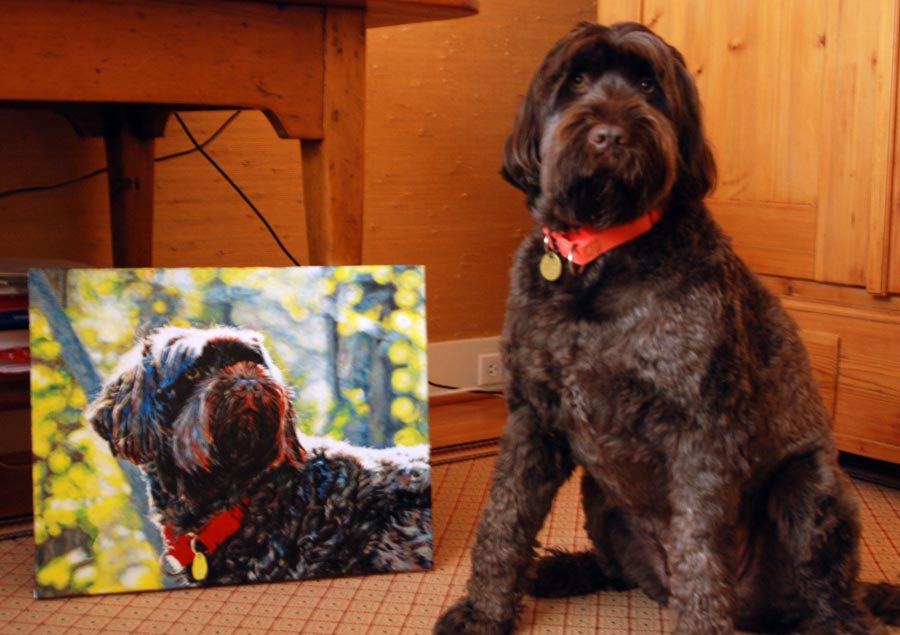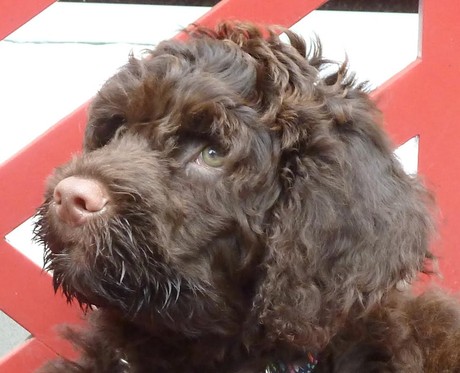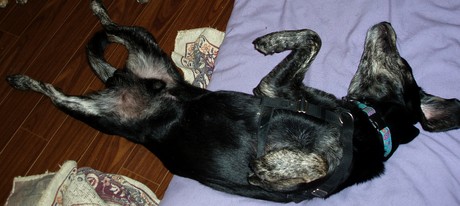The Family Jewels

Burton, the nose, the portrait featuring the nose.
I was looking at my puppy's balls the other night. Not deliberately, of course. McCracken was sprawled on his back, with his rear end positioned on the edge of my pillow, his junk gleaming pink-black in my peripheral vision. His balls, according to some of my friends (and not just those urging me to chop them off), are too big. It could just be a growth spurt thing; after all, puppies go through pinhead, or all-tummy, or lanky-legs phases. Nonetheless, I reported his too-big balls to my brothers. I thought they might be interested, having observed their life-long preoccupation with scratching their own.
"You know, Dad has really big bollocks," one of my brothers noted. I did not know. Or I'd never thought about it, in an evaluative sense. Apparently Mack Crack is continuing a family tradition, the lucky dog.
In my family such resemblances are discussed with a mix of sincerity and irony. Intellectually we know it's nonsense, but sometimes we get invested in the idea. For instance, one reason my mother loved Burton, her previous dog, was because of his bulbous schnozz. "Burtie has my nose!" my mother would announce (the 'Small' nose is a misnomer). Even after ten years of living with Burtie, her tone was one of surprised delight. None of us wanted the nose, but we envied the affection it inspired.

It's not clear if Trout, my mother's new pup, will develop a nose up to scratch with Burton's. Or hers.
And our family is not alone in our fascination with canine-human similarities. The internet abounds with pictures of people and pets with identical hair styles and colours, similar facial features, and matching, if appalling, fashions. Google "dogs who look like their owners" and you'll find a human-canine hall of mirrors. The uncanny resemblances identify who belongs with whom.
Naturally, a scientific study has been done on this important topic. Not on human-dog couple resemblances, exactly, but whether we can know who belongs with whom just by looking at them. Psychologist Sadahiko Nakajima ran a study in which participants were able to correctly guess dog-human pairs in 80 per cent of photographs.
In subsequent studies, by cropping out different parts of dog and human faces from the photos, Nakajima discovered that the key component is the eyes — the eyes signal a human-canine connected pair. Sadly for my mother, it's not the nose. And sadly for Mack Crack, the study neither mentioned nor pictured genitalia.
There's a lot of territory yet to be explored in the land of canine-human similitude. I have a friend who walks with a hip sway like Mae West's, and so does her dog. Coincidence? Perhaps a professor could look into it.
Nakajima's work reminded me of a study which detected resemblances in human couples. The study showed that spouses' facial features demonstrably converged after more than twenty-five years of marriage. The authors suggested that emotional mimicry/empathy, shared over years by cohabiting couples, resulted in the developed similarities. They concluded, "Kin resemblance, therefore, may not be simply a matter of common genes but also a matter of prolonged social contact."
Or, as the title of one photo collection of look-alike people-dog pairs puts it, "If You Love Her, She Looks Like You."
Addendum
As McCracken matured, he grew into his balls, which might now be considered well within the normal range (as far as we can tell in his predominantly castrati peer group). Of course, he retains his title of Family Jewel.

The Family Jewels on display.
About Sadahiko Nakajima's work: http://global.kwansei.ac.jp/academics/academics_203342.html
And another study by Stanley Coren: https://www.psychologytoday.com/blog/canine-corner/201308/do-dogs-look-their-owners
Study about resemblances in human couples: https://deepblue.lib.umich.edu/handle/2027.42/45361
Want to make a comment and avoid registering with Disqus? Click on 'join the discussion' and in the name field at the bottom of the form check "I'd rather post as a guest." A name and email address are still required.